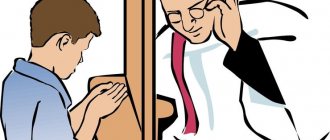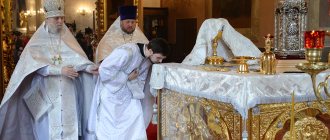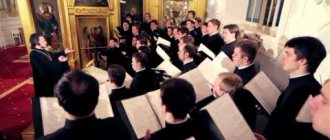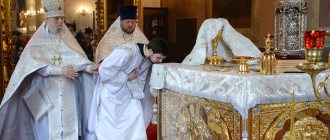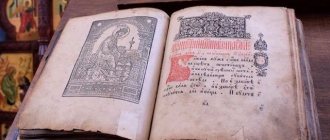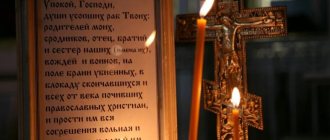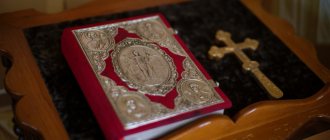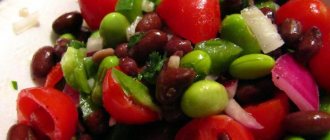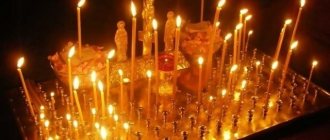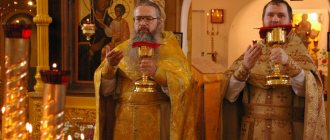Bright Week is the week after Easter, along with Holy Resurrection. The Orthodox hold divine services all these days - 4 services each: matins (matins), noon, liturgy and vespers (vespers). At this time, the Royal Doors - the iconostasis in the church - do not close until Saturday, that is, until the distribution of the liturgy. Before communion on Bright Week, you need to read not ordinary prayers, but special ones - with psalms, this is the Follow-up and the canon for Easter.
How to prepare for communion on Bright Week
The canon that regulates the rules of communion during Antipascha was created more than 13 centuries ago. This happened during the Council of Trullo in 691. It was there that Rule 66 was created, according to which:
«
From the holy day of the Resurrection of Christ our God until New Week, throughout the entire week, the faithful in the holy churches must continually practice psalms and hymns and spiritual songs, rejoicing and triumphant in Christ, and listening to the reading of the Divine Scriptures, and enjoying the Holy Mysteries. For in this way we will be resurrected together with Christ and ascended
».
At the same time, minimal preparation for communion after the Easter holidays during Bright Week is required.
- There is no need to fast. Even Jesus Christ, after multiplying the loaves, said: “I do not want to send them away without eating, lest they faint on the way” (Matthew 15:32). After the end of Lent, Christians no longer need additional restrictions. They have already shown their steadfastness on the path to God. Therefore, there is no need to torture yourself unnecessarily and fast the day before.
- Meat is allowed. Moreover, according to the same 66th rule, refusing fast food on Bright Week is a real heresy. According to church canons, priests and laity who refuse meat due to prejudice are anathema. But this rule does not apply to those who simply follow vegetarianism or cannot eat meat for health reasons.
- You need to come to church on an empty stomach. This is the only significant limitation. As Archpriest Valentin Ulyakhin points out, in early Christianity people received communion daily. In the modern world, this is impossible for most lay people. But it is during Bright Week that it is advisable to find time for daily communion from Monday to Sunday.
Communion is open to everyone. There are two equally erroneous opinions. Some believe that before Easter and after the holiday, only the laity who are under penance, as well as sinful people who are trying to atone for their sins, receive communion.
On the one hand, this is true, because it is during Easter week and Antipascha that they can read prayers, take communion and cleanse themselves in church before the face of God, although at other times the path to church is closed to them. But this does not mean that the rest of the laity should refuse to participate in the sacrament.
Also read: Can you drink alcohol on Easter?
There is another opinion that on Bright Week some special preparation for communion is required. That a person must be especially pure before reading prayers.
Rules for Holy Communion
Preparation for Communion in order to take part in the Sacrament are spiritual exercises that take place under the supervision of a confessor in order to achieve a special moral infusion. A priest whom you especially respect can become a confessor. Preparation consists of reading prayers and general repentance. But it is important not only to follow certain rules, but also to long for union with Christ.
There are 2 types of prayers - church and home. It is necessary not only to attend services, but, in order to prepare, to constantly conduct divine services at home, out loud or in the shower, silently. A mandatory rule is to attend prayers in God’s temple on the eve of Easter. At home you need to read:
- Following to communion or the Orthodox prayer book;
- canons: repentance to Jesus, prayer service to the Most Holy Theotokos, to the Guardian Angel;
- Akathist for Holy Communion.
Some priests recommend reading the Easter Canon throughout Bright Week, regardless of the time of day. It is considered an equivalent replacement.
Those who have not observed fasts cannot partake of Christ’s body and blood without confession. If a person is not sufficiently prepared, he must tell his confessors this. In this case, repentance is prescribed - it is recommended to fast for a certain number of days, from 3 to 7, before Communion.
At this time, it is necessary not only to abandon the fast food. They limit their drinking, refuse spiritual entertainment - not only visiting public places, restaurants, theaters and cinemas, but also watching movies at home and listening to secular music. Restrictions are placed on the physical intimacy of spouses.
Strict fasting begins not after Easter, but before Communion. People go to the temple on an empty stomach, as before testing their blood sugar levels. But you can’t not only drink, eat, but also smoke.
Attention! If you need to constantly take medications that affect your life, the church does not place any restrictions.
Already on Easter you need to tune in to a special state of mind. At this time, no one should make comments, judge, or gossip. Whenever possible, you should choose solitude. Even if your loved ones are silent, you inevitably watch what is happening, which is why you won’t be able to fully concentrate. But, when at this time you read the Gospel, study the lives of the Saints or review books with spiritual content, do not be distracted by worldly things. It is advisable to refuse to meet with people who do not think about the Divine and may push them to sin.
Before Communion, you need to cleanse yourself - list your sins to the priest. Choosing a confessor is not easy. Unfortunately, nowadays we have encountered confessors who do not observe the secret of confession. Repentance is not limited to talking with a clergyman. You need to apologize to those who were offended, try to make peace with those who hurt you. When listing misdeeds, you should give an account of your actions and not shift the blame to others.
If you are visiting church for the first time, because you have not thought about the soul before, you should approach your confessor the day before, before the church is filled with parishioners. But this can be done before the liturgy. Among believers, it is considered good form to arrive early. Lateness is seen as neglect. In some churches, confession continues after the liturgy - exceptions are made for children and the sick. Parishioners under 7 years of age are not required to go to confession. It is enough for them to receive the blessing once.
When the Holy Gifts are taken out of the altar, parishioners must let in everyone who, due to physical limitations, cannot see the sacrament from behind. This group includes the infirm, including wheelchair users, and children. You should prepare in advance before approaching the Chalice: fold your arms over your chest. You can’t be baptized at this moment - there are a lot of people around, you can accidentally push someone away. Approaching the gifts, they pronounce the Christian name loudly, and then open their mouths and partake of the Holy Gifts. You should immediately swallow without holding it in your mouth or savoring it, kiss the edge of the dish, quickly move to the table and taste the prosphora. Now wash it down with warm water.
But it is not customary to leave immediately; you must wait until the priest is free and kiss the Holy Cross. For the next 24 hours, you should behave decently, completely refraining from shouting and swearing. Otherwise there is no point in Holy actions.
Prayers before communion
Antipascha traditions are slightly different from preparations before communion at other times of the year. The general rule includes three prayer canons that must be read on Bright Week after Easter.
The first among them is the Easter canon. It is read at Matins during the Liturgy. Therefore, there is no need to repeat it separately at home and at other times. It also replaces the reading of the Psalter and 3 canons before communion.
About Communion on Holy Week
Metropolitan Hilarion (Alfeev)
I believe that priests who do not bless communion on Easter are making a very serious mistake. Why? Because the Liturgy is served so that people receive communion.
During Great Lent, the Liturgy is not served on weekdays - Mondays, Tuesdays and Thursdays. And this lack of opportunity to receive communion is a sign of repentance and fasting. And the fact that the Charter prescribes serving the Liturgy on Bright Week every day precisely means that people are called to receive communion every day.
Why shouldn't they fast on Easter week? Because, as Christ said, “can the sons of the bridal chamber mourn while the bridegroom is with them?”
Easter is the most important holiday of the Christian Church. All of Lent is preparation for Easter. How can you demand from a person that he also fast on Bright Week if he wants to receive communion!
***
Easter Clock
This is the order that one must read the entire Holy Week instead of morning and evening prayers, as well as before communion:
If the priest: Blessed is our God:
The worldly one says: Through the prayers of the saints our fathers, Lord Jesus Christ our God, have mercy on us. Amen.
Christ rose from the dead, trampling down death by death, and giving life to those in the tombs.
(Thrice)
Having seen the Resurrection of Christ, let us worship the holy Lord Jesus, the only sinless one. We worship Thy Cross, O Christ, and we sing and glorify Thy holy resurrection: for Thou art our God, do we know no other to Thee, we call Thy name. Come, all faithful, let us worship the holy resurrection of Christ: behold, joy has come through the Cross to the whole world. Always blessing the Lord, we sing of His resurrection: having endured crucifixion, destroy death by death.
(Thrice)
Ipakoi, voice 8th
Having anticipated the morning of Mary, and having found the stone rolled away from the tomb, I hear from the angel: in the light of the ever-present Being, with the dead, why do you seek as a man? You see the graveclothes, preach to the world that the Lord has risen, the slayer of death, as the Son of God, saving the human race.
Kontakion, tone 8
Even though you descended into the grave, Immortal, you destroyed the power of hell, and you rose again as a conqueror, Christ God, saying to the myrrh-bearing women: Rejoice, and grant peace to your apostles, grant resurrection to the fallen.
About Communion on Easter and Bright Week
Abbot Peter (Pruteanu)
I have been repeatedly asked the following question: “Can we receive communion on Easter? And on Bright Week? To receive communion, do we need to continue fasting?”
Good question. However, it betrays a lack of clear understanding of things. On Easter it is not only possible, but even necessary to receive communion. In favor of this statement, I would like to summarize a number of arguments:
- In the first centuries of the history of the Church, as we see in the canons and patristic works, participation in the Liturgy without communion of the Holy Mysteries was simply unthinkable. However, over time, especially in our area, the level of piety and understanding among Christians began to decline, and the rules for preparing for communion became stricter, in some places even excessive (including double standards for clergy and laity). Despite this, communion on Easter was a common practice, continuing to this day in all Orthodox countries. However, some put off communion until Easter itself, as if someone is stopping them from taking the Chalice every Sunday of Lent and throughout the year. Thus, ideally, we should receive communion at every liturgy, especially on Maundy Thursday, when the Eucharist was instituted, on Easter, and on Pentecost, when the Church was born.
- For those who are entrusted with penance due to some serious sin, some confessors allow them to receive communion (only) on Easter, after which, for some time, they continue to bear their penance. This practice, which, however, is not and should not be generally accepted, took place in ancient times, to help penitents, to strengthen them spiritually, allowing them to join in the joy of the holiday. On the other hand, allowing penitents to receive communion on Easter indicates that the mere passage of time and even the personal efforts of the penitent are not enough to save a person from sin and death. After all, for this it is necessary that the risen Christ Himself send light and strength to the soul of the repentant (just as the Venerable Mary of Egypt, who led a dissolute life until the very last day of her stay in the world, was able to take the path of repentance in the desert only after communion with Christ) . This is where the erroneous idea arose and spread in some places that only robbers and fornicators receive communion on Easter. But does the Church have a separate communion for robbers and fornicators, and another for those who lead a Christian life? Isn't Christ the same at every liturgy throughout the year? Doesn’t everyone commune with Him - priests, kings, beggars, robbers, and children? By the way, the word of St. John Chrysostom (at the end of Easter Matins) calls everyone without division to communion with Christ. His call: “Those who have fasted and those who have not fasted, rejoice now! The meal is plentiful: be satisfied, everyone! Taurus is big and well-fed: no one will leave hungry!” clearly refers to the sacrament of the Holy Mysteries. It is surprising that some read or listen to this word without realizing that we are not called to a table with meat dishes, but to communion with Christ.
- The dogmatic aspect of this problem is also extremely important. People are jostling in lines to buy and eat lamb for Easter - for some, this is the only “biblical commandment” that they observe in their lives (since the other commandments do not suit them!). However, when the book of Exodus speaks of the slaughter of the Passover lamb, it refers to the Jewish Passover, where the lamb was a type of Christ the Lamb slain for us. Therefore, eating the Passover lamb without communion with Christ means a return to the Old Testament and a refusal to recognize Christ as “the Lamb of God who takes away the sin of the world” (John 1:29). In addition, people bake all kinds of Easter cakes or other dishes, which we call “Easter”. But don’t we know that “Christ is our Passover” (1 Cor 5:7)? Therefore, all these Easter dishes should be a continuation, but not a replacement, for the communion of the Holy Mysteries. This is not particularly talked about in churches, but we should all know that Easter is, first of all, Liturgy and communion with the Risen Christ.
- Some also say that you cannot take communion on Easter, because then you will eat the savory meal. But doesn't the priest do the same thing? Why then is the Easter Liturgy celebrated, and after it it is blessed to eat dairy and meat? Isn’t it clear that after communion you can eat everything? Or maybe someone perceives the Liturgy as a theatrical performance, and not as a call to communion with Christ? If eating the humble meal were incompatible with communion, then the Liturgy would not be celebrated on Easter and Christmas, or there would be no breaking of the fast. Moreover, this applies to the entire liturgical year.
- And now about communion on Bright Week. The 66th canon of the Council of Trullo (691) orders that Christians “enjoy the Holy Mysteries” throughout Holy Week, despite the fact that it is continuous. Thus, they begin communion without fasting. Otherwise there would be no liturgy, or fasting would continue. The idea of the need to fast before communion concerns, first of all, the Eucharistic fast before receiving the Holy Mysteries. Such a strict Eucharistic fast is prescribed for at least six, or even nine hours (not like Catholics, who receive communion an hour after the meal). If we are talking about a multi-day fast, then the seven-week fast that we kept is quite enough, and there is no need - moreover, it is even forbidden - to continue fasting. At the end of Bright Week, we will fast on Wednesdays and Fridays, as well as during three other multi-day fasts. After all, priests do not fast on Holy Week before communion, and then it is unclear where the idea came from that the laity should fast on these days! However, in my opinion, only those who have observed the entire Great Lent, who lead an integral, balanced Christian life, always strive for Christ (and not just through fasting) and perceive Communion not as a reward for their works, but as a cure for spiritual illnesses.
Thus, every Christian is called to prepare for communion and ask the priest for it, especially at Easter. If the priest refuses without any reason (in the event that the person does not have such sins for which penance is imposed), but uses various kinds of excuses, then, in my opinion, the believer can go to another church, to another priest ( only if the reason for leaving for another parish is valid and is not deceit). This state of affairs, which is especially widespread in the Republic of Moldova, needs to be corrected as soon as possible, especially since the highest hierarchy of the Russian Orthodox Church has given clear instructions to priests not to deny the faithful communion without obvious canonical grounds (see Resolutions of the Councils of Bishops in 2011 and 2013) . Thus, we should look for wise confessors, and if we have found them, we must obey them and, under their guidance, receive communion as often as possible. You shouldn't entrust your soul to just anyone.
There have been cases when some Christians began to take communion on Easter, and the priest laughed at them in front of the entire church meeting, saying: “Wasn’t seven weeks enough for you to take communion? Why are you violating the customs of the village?” I would like to ask such a priest: “Wasn’t four or five years of study at a religious institution enough for you to decide: either you will become a serious priest, or you will go to herd cows, because “stewards of the mysteries of God” (1 Cor 4:1) are not they can say such nonsense..." And we must talk about this not for the sake of ridicule, but with pain about the Church of Christ, in which such incompetent people serve. A real priest not only does not forbid people to receive communion, but also encourages them to do so and teaches them to live so that they can approach the Chalice at every liturgy. And then the priest himself rejoices at how different the Christian life of his flock becomes. “He who has ears to hear, let him hear!”
Therefore, “let us approach Christ with the fear of God, faith and love” in order to better understand what “Christ is risen!” means. and “Truly risen!” After all, He Himself says: “Truly, truly, I say to you, unless you eat the Flesh of the Son of Man and drink His Blood, you will not have life in you. He who eats My flesh and drinks My blood has eternal life, and I will raise him up at the last day” (John 6:53-54).
translation by Elena-Alina Patrakova
Follow-up to Communion
According to the prayer rule for Bright Week, the psalms must be omitted from the text. Therefore, before communion, one must mentally read the verses of Metaphrast translated from the liturgical language:
Also read: What can and cannot be done for Easter?
Behold, I begin Divine Communion; Creator, do not burn me with communion! For You are a fire that burns the unworthy; but cleanse me from all filth.
Then:
Accept me as a participant in Your mystical Supper on this day, Son of God. For I will not tell secrets to Your enemies, I will not give You a kiss like Judas. But like a thief I confess You: “Remember me, O Lord, in Your Kingdom!”
And poems:
Shudder, man, when you see the deifying Blood: for it is a burning coal, scorching the unworthy. The Body of God both deifies me and nourishes me: it deifies the spirit, but it nourishes the mind incomprehensibly.
Then the troparia:
You attracted me with love, Christ, and changed me with divine desire for You. But burn my sins with immaterial fire and grant me to be satisfied with pleasure in You, so that I, rejoicing, may magnify Your two comings, O Good One.
How can I, unworthy, enter into the bright host of Your saints? After all, if I dare to enter the bridal chamber with them, my clothes will expose me, for this is not what they wear to marriage, and, bound, I will be expelled by the Angels. Cleanse, Lord, the filth of my soul and save me, as a Lover of mankind.
Are you baptized?
Master of Theology, rector of the Church of the Life-Giving Trinity in Trinity-Golenishchevo, Archpriest Sergius Pravdolyubov does not give communion on Easter to those whom he sees for the first time before the Chalice: “When I give communion on Easter, I will not give communion to a single stranger. I have no right to give him communion. What if he is not baptized? Where did he confess? You need to know that he is baptized, a believer and fasting. In our parish, approximately 700 people have received communion on Easter for 20 years. I know them all by sight and name, I know their families, their difficulties.” Of course, you can ask such people, strangers to the priest, before the cup: are you baptized, have you confessed? But this is not very convenient for Easter: there are too many communicants. In addition, there are misunderstandings. Father Sergius talks about one of these misunderstandings with a laugh: “Once it turned out that I asked Prince Zurab Chavchavadze whether he had been baptized. I didn’t know his face! It seems to me that he was offended by me for quite a long time.”
What prayers should children read?
Many parents who want to prepare their child for the first visit to the temple time it to coincide with Bright Week. At this time, the rules on how to prepare for communion and what to read before the sacrament are simpler. Children do not have to fast and it is easier to remember the text. So, clergy recommend reading 3 prayers:
Our Father - 3 times
Our Father, who art in heaven!
Hallowed be Thy name, Thy kingdom come, Thy will be done, as it is in heaven and on earth. Give us this day our daily bread; and forgive us our debts, just as we forgive our debtors; and do not lead us into temptation, but deliver us from the evil one. For Yours is the kingdom and the power and the glory forever. Am
yin.
Rejoice, Virgin Mary - 3 times
Virgin Mary, Hail, blessed Mary, the Lord is with you, blessed are you among women and blessed is the fruit of your womb, for you have given birth to the Savior of our souls.
Briefly about the features of communion on Bright Week
- How often . Rule 66 of the VI Ecumenical Council orders all Christians to receive communion daily throughout Bright Week.
- Post . The Eucharistic fast, as always, begins at midnight. “During the period of Bright Week, Christians observing Great Lent begin Holy Communion, limiting their fast to not eating food after midnight” (On the participation of the faithful in the Eucharist).
- Prayers . The preparatory prayers consist of the Easter Hours and the Follow-up to Holy Communion without psalms. If possible, it is useful to also read the Canon of Holy Pascha. The peculiarities of the prayer rule on the day of Holy Easter should also be taken into account.
- Confession . In many parishes there is a practice of Communion without Confession on Bright Week for the faithful who received communion from Maundy Thursday to Easter day inclusive.
***
Archpriest Dimitry Smirnov
Rule 66 of the VI Ecumenical Council orders all Christians to receive daily communion of the Holy Mysteries of Christ throughout Bright Week. This is the rule of the Ecumenical Council.
Many people still have the heretical idea (this is a real heresy, condemned by the Ecumenical Council) that meat and the sacrament are incompatible. Some Hindu considerations are brought in there: that this is a killed animal and other nonsense. As if potatoes are not a dead plant. This is not a Christian idea at all, because it is said: “Whoever abhors meat because of uncleanness, let him be anathema.” But many people have a specific attitude towards meat. There was a fast - the person fasted, now there is no fast - the person does not fast.
I do not forbid communion. What about me? I myself ate meat yesterday, and today I serve. If I, a priest, do this, does it mean that I can, but he can’t? By what right? Unclear. A priest must live more strictly than a layman. It turns out that the priest allows everything to himself, but not to others. This is hypocrisy.
***
